 Petzlover
Petzlover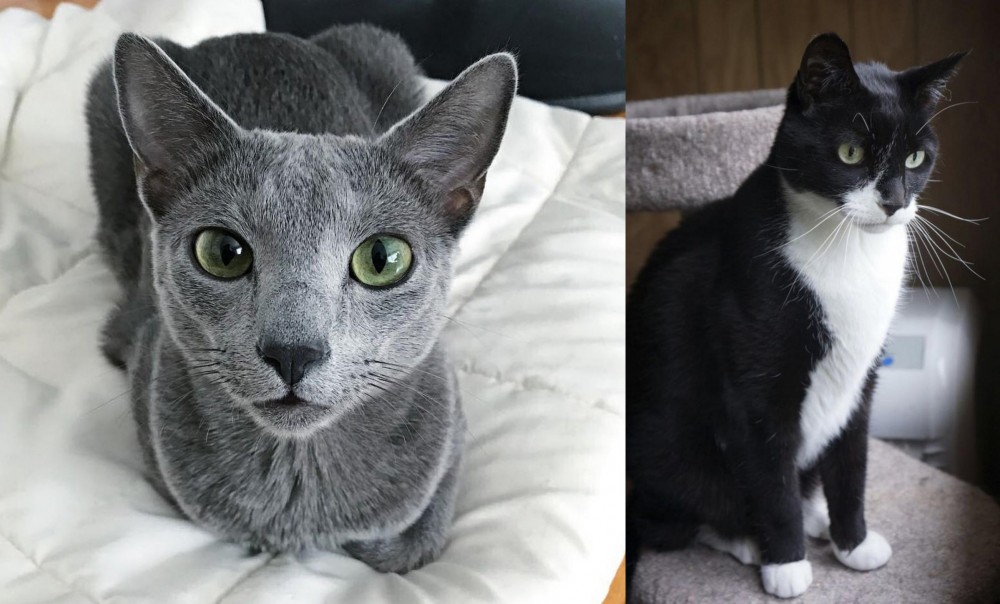 Blue Russian is originated from Russia but Tuxedo is originated from United States. Both Blue Russian and Tuxedo are having almost same weight. Both Blue Russian and Tuxedo has same life span. Both Blue Russian and Tuxedo has same litter size. Blue Russian requires Low Maintenance. But Tuxedo requires Moderate Maintenance
Blue Russian is originated from Russia but Tuxedo is originated from United States. Both Blue Russian and Tuxedo are having almost same weight. Both Blue Russian and Tuxedo has same life span. Both Blue Russian and Tuxedo has same litter size. Blue Russian requires Low Maintenance. But Tuxedo requires Moderate Maintenance
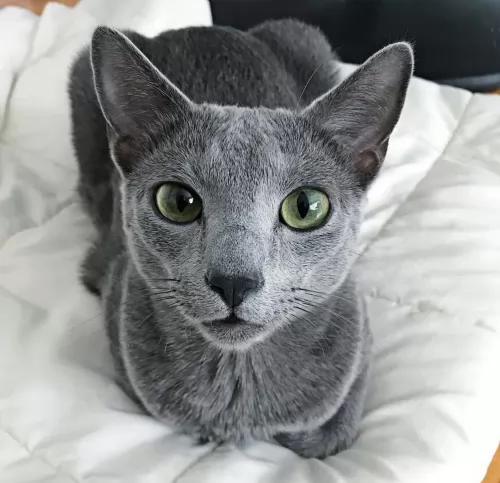 The Blue Russian is a rare cat and not much is known about its origins, but it is believed that the cat comes from northern Russia.
The Blue Russian is a rare cat and not much is known about its origins, but it is believed that the cat comes from northern Russia.
The Cat Fanciers Association believes that the cat descended from cats kept by Russian Czars. Research tells us that there is no mention of the Blue Russian until the 19th century. The Russia Blue made its first public appearance in 1875, being exhibited at London’s Crystal Palace as the ‘Archangel Cat’.
By 1912, the Russia Bue was given its own classification after its introduction to the USA in the early 1900s.
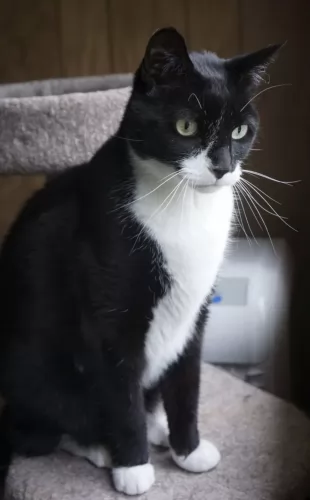 The Tuxedo cat is essentially a black and white cat and the name comes from him looking like he is dressed in a formal tuxedo.
The Tuxedo cat is essentially a black and white cat and the name comes from him looking like he is dressed in a formal tuxedo.
Tuxedos aren’t a new cat breed and they have been around for thousands of years. Tuxedo is merely describing the coat of the cat. So the Tuxedo cat isn’t a cat breed but rather a pattern color. A Persian cat as an example, can be a tuxedo cat because of its coat.
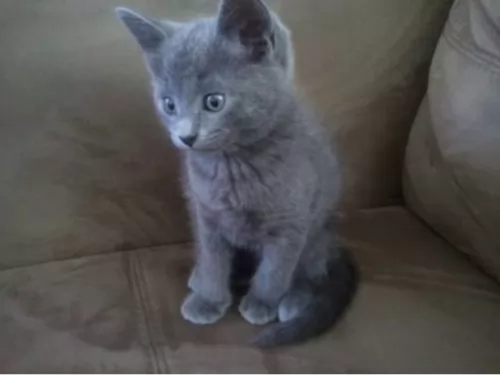 The Russian Blue is a medium-sized cat with a long, finely-boned boy. It is a slender cat, but he appears larger because of his dense double coat.
The Russian Blue is a medium-sized cat with a long, finely-boned boy. It is a slender cat, but he appears larger because of his dense double coat.
He weighs in the region of 3 – 6kg. In spite of the dense and luxurious short silvery coat, the cat doesn’t shed much. The coat can in fact be a silvery shade to a dark slate grey. The eyes are a beautiful green, the ears widely spaced and slightly rounded at the top.
The Russian Blue is a sweet-tempered cat who becomes attached to his human owner and who will even follow his owner much like a dog.
This particular cat breed may be quite shy, but he becomes social around his family members and may even be reluctant to share time with strangers.
He also doesn’t mind spending some time alone if you have to work. Curious and intelligent the Russian Blue is somewhat reserved but he makes a great companion as he is sensitive to his owner's moods.
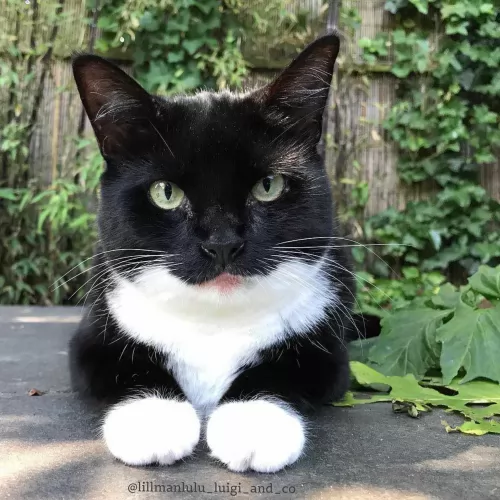 A tuxedo cat has distinct coat colors. Their bicolor coats are soft and sleek and sometimes the colors aren't limited to just black and white but they can be orange, gray or tortoiseshell.
A tuxedo cat has distinct coat colors. Their bicolor coats are soft and sleek and sometimes the colors aren't limited to just black and white but they can be orange, gray or tortoiseshell.
Because Tuxedo cats aren’t a breed, nothing is really set in stone with them and their size ranges. This means he can weigh between 3 and 7kg or 8 or even 9kg. The eyes of the Tuxedo cat are nearly always green.
The Tuxedo cat’s personality is varied as well because it can be any breed of cat. There are some Tuxedo cat owners who will say that their cats have a definite Tuxedo personality, but there is no research that indicates that these cats have a particular personality.
They are all different. Most Tuxedo cats however are friendly, social, loving, and lively.
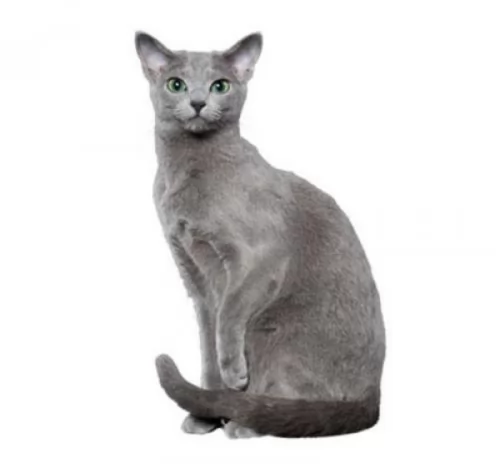 Russian blue cats are such intelligent creatures and he will require some mental stimulation because of it.
Russian blue cats are such intelligent creatures and he will require some mental stimulation because of it.
He loves mealtimes, but remember to not overfeed him as this shortens his lifespan.
He is a vocal cat and will tell you when he is hungry or he wants to play.
These cats don’t like too many changes so keep things the same for him.
When you try to keep your lovely Blue Russian happy, you’ll be rewarded by having a fantastic feline companion.
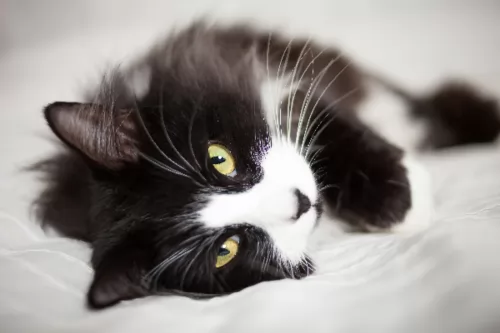 The tuxedo cat is such a sport - always up for fun and games. Cats like the tuxedo are always a great choice of pet.
The tuxedo cat is such a sport - always up for fun and games. Cats like the tuxedo are always a great choice of pet.
Cats like the tuxedo are also low maintenance and he is clever enough to even have a bit of training.
The tuxedo cat, even though he likes the outdoors, can also be an apartment cat. He also gets on well with children and other pets in the home. Having a tuxedo in the home is guaranteed to fill your home with joy, and you owe it to him to provide him with lots of love and attention.
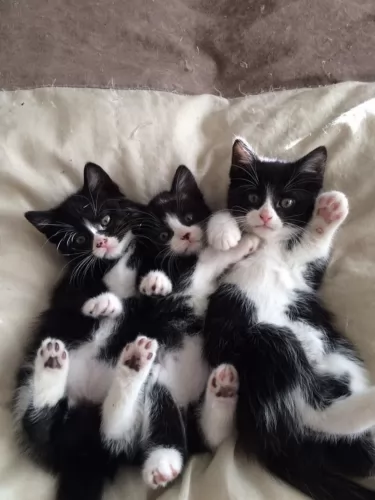 The Tuxedo cat has no real health concerns and that is just another reason why they make such popular pets. There are, however, always health issues that a cat can succumb to.
The Tuxedo cat has no real health concerns and that is just another reason why they make such popular pets. There are, however, always health issues that a cat can succumb to.
This is caused by kidney disease. It is one of the leading causes of death in older cats, and causes can include age but also genetics.
Your cat can show a number of symptoms such as excessive urination, nausea, terrible thirst, dehydration, constipation, and loss of appetite.
There is no cure for feline kidney disease but it can be treated and managed, and that is why you will need to see the vet.
This is the dreaded feline distemper for which your cat will need to be vaccinated against. It is a highly contagious viral disease, with kittens being more at risk.
After contracting the disease. It can spread through bodily fluids as well as fleas and is mostly transmitted by contaminated food and water bowls as well as litter trays.
The disease affects the intestinal tract of the cat and attacks the immune systems. Your cat will be vomiting, have diarrhea and anemia and he will have loss of appetite, lethargy and be totally and utterly down in the dumps.
Cancer is common in cats of all ages. When you brush your Tuxedo, be aware of any unusual lumps. Lymphoma is a common cancer in cats.
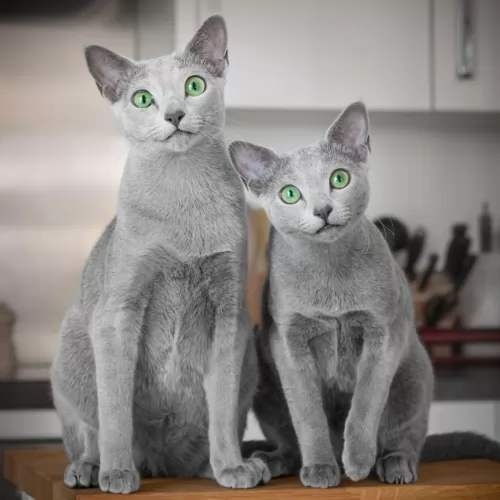 Part of caring for a cat as a responsible pet owner comes from feeding your pet. The Russian Blue is a cat that enjoys his food so you will have to look out for overfeeding.
Part of caring for a cat as a responsible pet owner comes from feeding your pet. The Russian Blue is a cat that enjoys his food so you will have to look out for overfeeding.
A cat that is overweight can start developing joint problems and diabetes. Rather stick to scheduled meals so that you can know exactly what your feline pet is getting. Such a beautiful cat needs the best food there is to keep the coat shiny and healthy and to prevent illness.
Always read the food labels to ensure the best ingredients and the right portion sizes. Make sure your cat gets food that is meat protein-rich as a cat is a carnivore.
Water is another important part of your Blue Russian’s diet. Fresh cool water should be available for your cat night and day. Water bowls are good but a water fountain is a tantalizingly attractive way for your pet to be attracted to drinking more water.
Make sure that you rake up all your cat’s droppings from the litter box every day as the Russian Blue is a hygienic cat and wants a clean litter box. Make sure the litter box is in a nice quiet spot for your cat.
The cat has a dense coat but isn’t a heavy shedder and requires very little grooming.
Ensure a decent bed for your Bombay cat. Any soft cat bedding will do, and while some cats like a simple flat mattress-type bedding arrangement, other cats like the idea of getting into a bed that provides some privacy.
You just have to find yourself a decent pet shop because when you do, you’ll find a host of soft, warm, fully washable blankets and pillows for your pet. Once you’ve decided on the right bed and a nice quiet spot, your cat will have a complex issue sorted out as some cats can be fussy with their sleeping arrangments.
Make sure your cat is neutered or spayed to avoid unwanted kittens. Neutering offers health benefits, reducing the risk of different cancers. Your cat also no longer has the desire to fight over mates and territory.
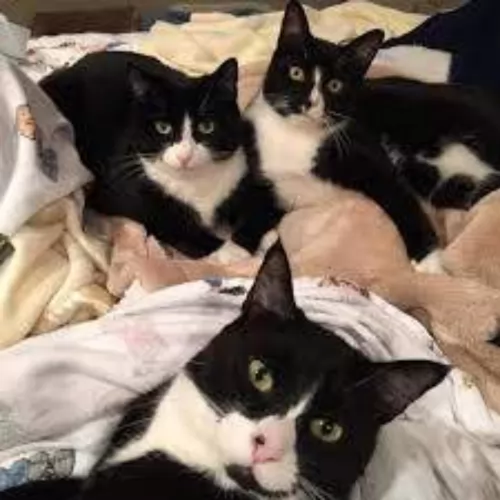 The Tuxedo cat is cared for in much the same way that you would care for any other cat really.
The Tuxedo cat is cared for in much the same way that you would care for any other cat really.
The coat of the Tuxedo requires no special treatment as the coat isn’t really ever long. Simply brush it at least once a week to reduce matting and dust collecting on the coat. You want to keep it shiny and sleek.
Provide a scratching post and a climbing tree as these are both taking care of natural instincts of a cat – to scratch and to leap.
Ensure your pet isn’t bored. Provide him with plenty of opportunities to have fun and to play. Provide him with interactive toys to keep him amused.
Cats like to sleep quite a bit so provide him with a nice soft bed in a quiet area.
If your Tuxedo is an indoor cat, he will need a litter box in a quiet area. Be sure to clean the litter box of feces every single day. Make sure that the actual litter is kept clean and tidy.
Your Tuxedo cat should be fed the same diet as any other cat. This is because every cat there is is a carnivore and their diet has to be made up of meat. A wet food diet or a dry food diet is available but make sure it is always of the highest quality. This will ensure your pet gets all the nutrients to ensure good health. Discuss your cat's s dietary needs with your vet if you are in any doubt.